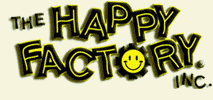ELIZABETH MILLER
emiller@thespectrum.com
CEDAR CITY — Without even knowing the wish he was granted, Happy Factory co-founder Charles Cooley was speechless about the fact that the nationally televised show “Three Wishes” would promote his non-profit organization.
“The whole Happy Factory is overwhelmed,” Cooley said. “I don’t sleep at nights — I’m still trying to imagine what’s going on and what will happen.”
Cooley and his wife, Donna, did not make the wish that initially connected them to the show, but once the communication started rolling, they did make another wish — that the organization would have enough money for its annual budget, $60,000.
The Happy Factory makes wooden toys and donates them to children throughout the world. All of the materials, equipment, labor and shipping is donated, but a large part of the company’s annual budget — $35,000 — is strictly for toy wheels and axles.
“Three Wishes” hostess Amy Grant spent Tuesday morning at the Happy Factory, and as she learned about the process, she even made her own toy. But when it was time for the wish to be revealed, the public was excused, and the wish has yet to be made public.
Grant spent time talking to Donna Cooley about how the Cooleys never travel to deliver any of the toys, and while one might speculate a trip is in store, there are no definite answers as to what was gifted.
Happy Factory board member LynAnn Ellsworth, who was volunteering, echoed Charles Cooley’s wish, saying the budget is crucial to the organization.
“Cedar City is so generous, but this is a worldwide humanitarian effort. It’s hard for Cedar City to support a world wide effort,” she said.
Ellsworth said the exposure of The Happy Factory alone is a wish come true.
“This TV show will give us national exposure, which we hope with time will turn into national support so the Happy Factory will never have to stop making toys,” she said.
As all this was going on, there were cameras and crews moving around, but it truly was unscripted television. There were no cue cards, no teleprompters, and the only time the camera was turned off was if something conflicted with the shot.
Executive Producer Andrew Glassman watched monitors in another room, and even his stage cues were kept to a minimum.
“I don’t think I’ve ever known a group of people as nice as these here,” Charles Cooley said. “They must produce a good show for the kind of people they are.”


